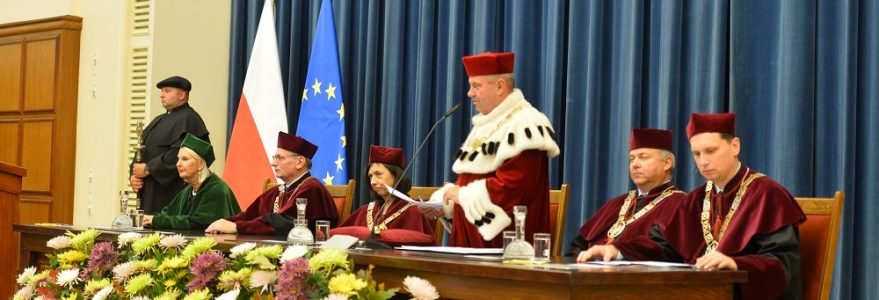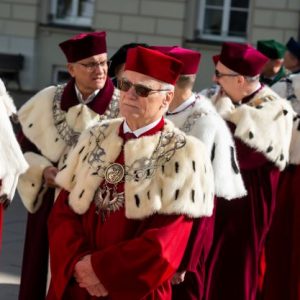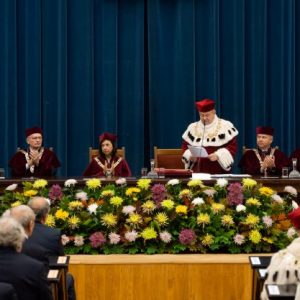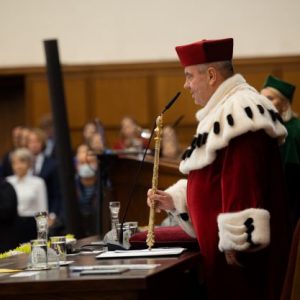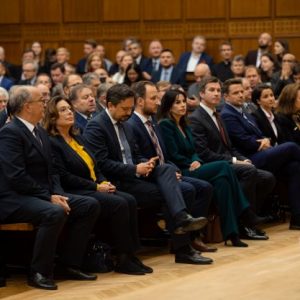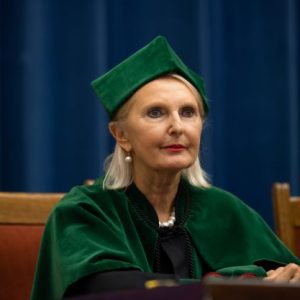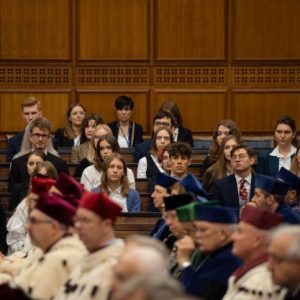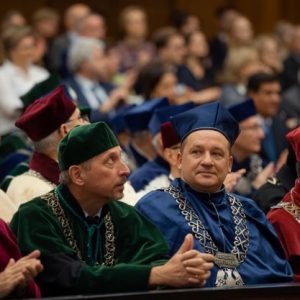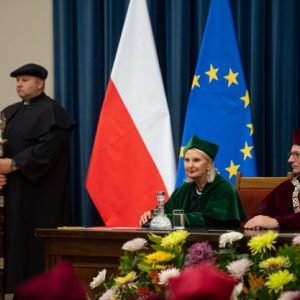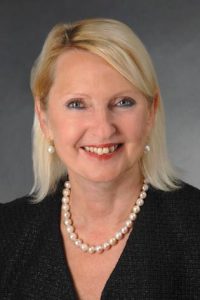“With the community of 70,000 members, the University of Warsaw is an elite institution. The quality of research and teaching remains the major goal of the university. Our students are the elite of the Polish youth, while many UW researches might be future Nobel Prize laureates,” Prof. Alojzy Z. Nowak, the UW Rector, commenced the official inauguration of the 2022/2023 academic year at the University of Warsaw. The event was held on 3rd October, in the building of Auditorium Maximum on the university historical campus at Krakowskie Przedmieście.
Quod felix, faustum fortunatum que sit! (May it be good, fortunate and prosperous!). The Latin sentence starts another academic year. The inauguration began with a ceremonial commencement procession of members of the Senate and the authorities of the University of Warsaw who were marching from the Kazimierzowski Palace towards the building of Auditorium Maximum on the main campus at Krakowskie Przedmieście. The official opening of the 2022/2023 academic year was held in the Adam Mickiewicz Hall located on the historical campus of the University of Warsaw.
The official opening of the new academic year was preceded by singing of the National Anthem of Poland and the Anthem of Europe. The representatives of the “Krybar” combat group of the Warsaw Uprising as well as the other gathered eminent guests were greeted by Professor Alojzy Z. Nowak, the UW Rector. In his opening speech the Rector emphasised hitherto achievements of the University of Warsaw as well as challenges it needs to face.
The new year and new challenges
In the first part of his speech, the UW Rector addressed new students, “You represent the elite of the Polish youth. We are very proud of you as you become part of the academic community of 70 thousand members. The university is currently carrying out about 1,400 research programmes that are worthy of PLN 350-370 million altogether. The university is the site of knowledge and scientific development, also internationally,” the Rector said. Further he pointed to the activities that are undertaken to strengthen the UW position in the international rankings.
The UW Rector indicated that the University of Warsaw is an internationalised unit with approximately 1,000 contracts with institutions from abroad, the 4EU+ Alliance and 4,000 student mobility exchanges. “We hope each one of our students would have part of their studies performed abroad,” the Rector said.
Prof. Alojzy Z. Nowak mentioned how important the cooperation of the university and business is and emphasised the fact that the University of Warsaw would never be an institution that educates its students by the needs of the market. “We intend to shape the market. We want to train employers with the emphasis on the mutual respect and the freedom of speech. And we are giving you an ability to have diverse ideas and views, an opportunity to develop and discuss using arguments, ask difficult questions and seek answers to these questions. The striving for the truth is our goal.”
The Rector referred to the investments, saying “We have several investments under the multiannual development plan ‘Uniwersytet Warszawski 2016-2027’. We have opened a building for the faculties of modern languages and applied linguistics at 55 Dobra street.” Prof. Nowak pointed to the necessity of pro-ecological actions under the “Intelligent Green University” programme.
Further he mentioned how meaningful the “Excellence Initiative – Research University” programme is, as well as the newly-formed Faculty of Medicine being a pillar of the univeristy.
“The Faculty of Medicine is coming back to the UW having been absent here for decades. We have enormous research potential of biologists, physicists and chemists, ethics specialists, etc. who have been doing their medicine-related research work for years. The new faculty will strengthen the university and support the whole community,” the UW Rector commented on the newly-formed Faculty of Medicine.
Prof. Nowak also mentioned the help from the UW community to the Ukrainians.
“The UW provided the 250-million złotych package of help to Ukraine, which is the largest humanitarian help package from a single institution in Poland. We have offered additional places to study as well as students’ halls for the Ukrainians. We have launched medical and psychological assistance. We teach the Polish language to the Ukrainians,” the Rector said.
The ceremonial matriculation
At the matriculation ceremony, the students and doctoral candidates, who obtained the highest admission scores, took an academic oath and received traditional student books. This was followed by speeches from representatives of students and doctoral candidates: Kamil Bonas, the President of the Students’ Union, and Przemysław Mroczkowski, the President of the PhD Students’ Union.
“I can tell you with a lot of satisfaction that our Alma Mater has been transformed over the year. It is the fruit of the hard work and responsible attitude of many people, employees, administrative staff, lecturers, PhD candidates, people who study and the authorities of the University of Warsaw of both these and previous term. Our university has become better prepared to support people who are faced with metal health issues. The brand of the UW, among other things through the membership within the 4EU+ Alliance, is growing in its recognition outside Poland. We have evolved into a socially responsible organisation, including social campaigns of ecology and equality. We want to support others. All of us are equal and equally important,” Kamil Bonas said.
“The gowns we are dressed in today were worn by our predecessors decades ago, and the meeting shows us that we are the part of a huge rally of generations, and our duty and task is just to carry on. Each community needs a moment to come together and remind that we are the community indeed. We are mutually responsible for each other, look left and right and learn the name of who is sitting next to you, the person you are responsible for,” Przemysław Mroczkowski said. “When we met here last year, the pandemic was still holding us and that year was also marked by the brutal and unjustified Russian invasion on Ukraine. Let me thank our brothers and sisters from Ukraine. Your dedication is memorable and should never be forgotten.”
The prescription for success
The opening lecture “Towards the career in the USA. The prescription for success.” was delivered by Professor Maria Siemionow of the University of Illinois, Chicago (UIC), an expert in orthopaedics and director of the microsurgery education in UIC.
Prof. Siemionow is a world-renowned scientist and an expert on vascularised composite allografts, hand surgery, peripheral nerve surgery and microsurgery. She was talking about her professional pathway that started in Poznań, Helsinki, and finally reached the United States. She was describing the places and the people she encountered on her way, as well as the laboratories she set up.
“It is important to be aware where you go, and also to remember where you are from and remember your teachers,” Prof. Siemionow said to young students. “You are challenged to remember your roots and your goals.”
Prof. Maria Siemionow was talking about her scientific passions, about the introvital microscope models to observe microcirculation, cell therapy in peripheral nerves rehabilitation, experimental models of vascularised facial allografts, and facial and scalp transplantations in the rat, then in the human. “You can have many passions and interests. Yet, each of them may lead to very interesting and important achievements, research papers and doctoral dissertations,” the surgeon said. “Sometimes your achievements have a number of challenges you have to tackle, and, finally, learn what they were for, or if they can be useful in teaching young doctors-to-be.”



